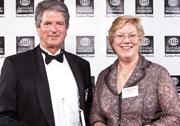Triple Eureka
The world-record in solar cell efficiency, a new class of cancer drugs, and a low-energy system for irrigation have won three UNSW researchers Eureka prizes - Australia's most prestigious science awards.
The world-record in solar cell efficiency, a new class of cancer drugs, and a low-energy system for irrigation have won three UNSW researchers Eureka prizes - Australia's most prestigious science awards.

The world-record in solar cell efficiency, a new class of drugs targeting cancerous tumours, and a low-energy system for irrigation have won three UNSW researchers top gongs at the 2010 Australian Museum Eureka Prizes, the country's most prestigious science awards.
Scientia Professor Martin Green won the prize for Leadership in Science for world-leading innovation in solar cell technology. He has held the world record for converting the sun's rays into electricity for the past two decades. Professor Green is the Executive Research Director of the ARC Photovoltaics Centre of Excellence in the Faculty of Engineering. It is his second Eureka award.
The winner of the prize for Medical Research Translation was Professor Philip Hogg, Director of the Lowy Cancer Research Centre. He was acknowledged for a new class of cancer therapeutics that target and disable the 'power supply' of tumour cells. Professor Hogg developed the first effective imaging agent for dying dead tumour cells, enabling the effectiveness of chemotherapy to be monitored in real time.
Associate Professor Greg Leslie, from the UNESCO Centre for Membrane Science and Technology in the Faculty of Engineering, along with his colleague Professor Bruce Sutton, from the University of Sydney, won the Water Research and Innovation prize. The pair, finalists in this category last year, developed a very efficient system for farmers to grow crops using saline water, including groundwater, without damaging the soil.
The prizes, worth $190,000, were presented at a black-tie dinner in Sydney, attended by the who's who of the science world, politicians and media.
UNSW researchers were nominated in six categories for the 2010 awards. Dr Vanessa Hayes from the Children's Cancer Institute and the Faculty of Medicine was a finalist for her work in establishing the most comprehensive collection of DNA samples in the world, representing diverse population groups.
The iCinema Centre for Interactive Cinema Research was in the running for Excellence in Research by an Interdisciplinary Team.
In addition, The Copenhagen Diagnosis, an Australian-led international initiative headed by Professor Matt England and Dr Ben McNeil from UNSW's Climate Change Research Centre, was a finalist in the inaugural Advancement of Climate Change Knowledge prize.
Five UNSW staff members were award judges and the University again sponsored the prize for Scientific Research, presented this year by Vice-Chancellor Professor Fred Hilmer.
For a full list of winners, go to the Australian Museum website.
Photo credits: Australian Museum Eureka Prizes and 247 Studios.